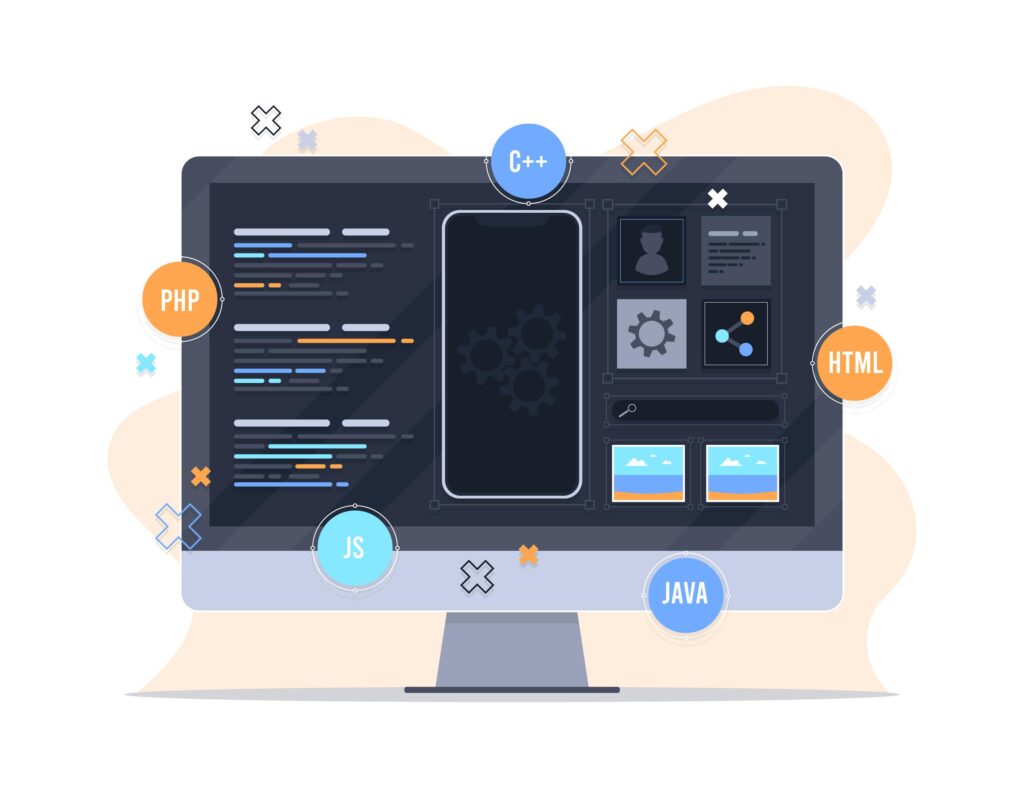How To Become a Professional Web Developer

In the dynamic world of digital innovation, the Web Developer emerges as a pivotal figure, blending artistry with technical acumen to sculpt the online experiences we navigate daily. Imagine wielding the power to transform code into captivating websites that engage and inspire. Intrigued by the prospect of delving into the realms of HTML, CSS, and JavaScript? This Introduction invites you to explore the multifaceted role of a Web Developer, from crafting responsive layouts to optimizing user interfaces. Ready to embark on a journey where creativity meets functionality? Join us as we unravel the intricacies of web development and unlock the keys to digital mastery.
Table of Contents
What Is a Web Developer?
A Web Developer is a skilled professional who specializes in creating and maintaining websites. These experts are proficient in programming languages such as HTML, CSS, and JavaScript, utilizing them to build interactive and user-friendly web pages. A Web Developer understands the intricacies of both front-end and back-end development, ensuring that websites not only look visually appealing but also function seamlessly across various devices and browsers. Their role involves coding, testing, and debugging to optimize website performance and user experience. In the ever-evolving digital landscape, Web Developers play a crucial role in shaping the online presence of businesses and individuals alike.
Types of Web Developers
Front-End Developer

A Front-End Developer is a master of crafting the user interface (UI) and experience (UX) of websites. Armed with expertise in HTML, CSS, and JavaScript, they transform design concepts into interactive realities that captivate users. Using frameworks like React and Angular, Front-End Developers ensure seamless functionality and responsiveness across diverse platforms. They optimize site performance through techniques such as code minification and responsive design, enhancing user engagement (UX) and retention. In the dynamic world of web development, Front-End Developers play a critical role in shaping digital experiences that blend creativity with technical precision.
Back-End Developer

A Back-End Developer is the architect behind the scenes of websites, focusing on server-side logic and database management. Proficient in languages like Java, Python, and Ruby, they build the functional backbone that supports the Front-End Developer‘s user-facing interface (UI). Back-End Developers design APIs (Application Programming Interfaces) that facilitate seamless communication between different software applications, ensuring robust functionality. They implement security measures like encryption to safeguard sensitive data and optimize performance through caching and database indexing. In the realm of web development, Back-End Developers are essential for creating scalable, efficient, and secure digital infrastructures.
Full-Stack Developer

A Full-Stack Developer is a versatile expert proficient in both front-end and back-end development aspects of web applications. They possess a comprehensive skill set encompassing languages like HTML, CSS, JavaScript, Java, Python, and more, allowing them to handle every aspect of a project’s technical implementation. Full-Stack Developers are adept at designing user interfaces (UI) that are not only visually appealing but also highly functional, while also managing server-side logic and database systems. They play a pivotal role in the entire development process, from initial concept to final deployment, ensuring seamless integration and optimal performance across all layers of a web application.
What Do Web Developers Do?
Web Developer

A Web Developer is a skilled professional who specializes in building and maintaining websites. They are proficient in HTML, CSS, JavaScript, and other programming languages, enabling them to create interactive and responsive web applications. Web Developers collaborate with UI/UX designers to ensure seamless integration of design elements into functional interfaces (UI). They are adept at using frameworks like React and Angular to enhance user experience (UX) and streamline development processes. Web Developers also focus on optimizing website performance through techniques such as code minification and caching. In today’s digital age, their role is essential in shaping online experiences that are both engaging and effective.
Web Designer

A Web Designer is a creative professional focused on the aesthetic and functional aspects of website design. They specialize in creating visually appealing layouts and interfaces (UI) that enhance user experience (UX). Web Designers use tools like Adobe Photoshop and Sketch to mock up designs and collaborate closely with Web Developers to bring these designs to life. They are skilled in typography, color theory, and user flow optimization, ensuring that each website not only looks stunning but also functions intuitively. Web Designers play a crucial role in shaping the digital presence of businesses and individuals, making websites both attractive and user-friendly.
Software Developer

A Software Developer is a proficient coder and problem solver who designs and develops applications for various platforms. They are fluent in multiple programming languages such as Java, Python, and C++, enabling them to create robust and scalable software solutions. Software Developers collaborate with stakeholders to gather requirements, analyze user needs, and design architectures that meet project objectives. They employ agile methodologies to iterate and improve software products continuously. Software Developers also focus on testing and debugging to ensure reliability and security. Their expertise extends beyond Web Development to include mobile apps, desktop software, and enterprise systems, making them pivotal in driving technological innovation.
Where Do Web Developers Work?
- Tech Startups: Often at the forefront of innovation, Web Developers thrive in startup environments where agility and creativity are key.
- Digital Agencies: These agencies specialize in web development services, offering Web Developers opportunities to work on a variety of client projects.
- Corporate IT Departments: Large companies maintain internal teams of Web Developers to manage and enhance their digital presence.
- Freelance: Many Web Developers choose to work independently, offering their skills to clients on a project-by-project basis.
- Remote Work: With the rise of digital nomadism, Web Developers can work from virtually anywhere with a stable internet connection, contributing to global projects seamlessly.
- E-commerce Companies: They play a crucial role in designing and maintaining online stores, ensuring smooth transactions and user experiences
- (UX).Education Institutions: Universities and schools employ Web Developers to manage their online learning platforms and educational websites.
- Government Agencies: These organizations rely on Web Developers to create and maintain citizen portals, interactive maps, and other public-facing applications.
- Healthcare Sector: Web Developers contribute to building and maintaining patient portals, medical record systems, and health information websites.
- Nonprofit Organizations: They help nonprofits extend their reach through engaging websites that facilitate donations, volunteer recruitment, and awareness campaigns.
Web Developer Skills
Soft Skills
- Communication: Beyond basic interaction, effective communication involves active listening, articulating ideas clearly, and fostering a positive team environment. This skill ensures smooth collaboration with colleagues and enhances client relationships.
- Problem-solving: Web Developers proficient in problem-solving can analyze complex issues, identify root causes, and devise innovative solutions. This ability is crucial for troubleshooting technical issues and optimizing website functionalities.
- Adaptability: In the dynamic realm of web development, adaptability allows developers to quickly adjust to new technologies, tools, and project requirements. It ensures they stay current with industry trends and effectively meet evolving client needs.
- Time Management: Efficient time management ensures that projects are completed within deadlines while maintaining high standards of quality. It involves prioritizing tasks, managing resources effectively, and minimizing delays.
- Creativity: Creative thinking enables Web Developers to envision and design engaging user interfaces (UI) and experiences (UX). It involves thinking outside the box, experimenting with design elements, and integrating aesthetic appeal with functional usability.
- Critical Thinking: This skill empowers developers to evaluate information objectively, assess project requirements thoroughly, and make informed decisions. Critical thinking enhances problem-solving capabilities and contributes to strategic planning and execution in web development projects.
Hard Skills
- Programming Languages: Mastery of HTML (HyperText Markup Language), CSS (Cascading Style Sheets), JavaScript, and Python empowers developers to create visually appealing and functional websites. These languages dictate how content is structured, styled, and interacted with on the web.
- Version Control Systems: Proficiency in Git facilitates efficient collaboration and code management, enabling developers to track changes, merge code seamlessly, and revert to previous versions when needed.
- Frameworks: Expertise in frontend frameworks like React, Angular, and Vue.js, and backend frameworks like Node.js enhances productivity by providing pre-built components and tools for rapid development and scalability.
- Database Management: Knowledge of SQL (Structured Query Language) or NoSQL databases allows developers to design and manage databases effectively, ensuring data integrity, retrieval efficiency, and scalability for web applications.
- Responsive Design: Understanding responsive design principles ensures that websites are accessible and user-friendly across devices of varying screen sizes, maintaining consistent functionality and aesthetics.
- Cross-browser Compatibility: Ensuring compatibility across major browsers such as Chrome, Firefox, Safari, and Edge guarantees a seamless user experience, irrespective of the browser preferences of website visitors.
Steps to Become a Web Developer
- Earn Degree(s)
To excel as a Web Developer, earning relevant degrees is a crucial first step. Pursuing a degree in Computer Science, Information Technology, or Software Engineering provides a solid foundation in theoretical concepts and practical skills essential for web development. These programs typically cover topics such as algorithm design, data structures, software architecture, and web technologies. A degree not only equips developers with in-depth knowledge but also demonstrates their commitment to mastering the complexities of modern web development. Additionally, specialized courses in frontend and backend development further enhance their expertise in creating dynamic and responsive web applications.
- Pursue Internship(s)
To kickstart a career as a Web Developer, pursuing internship(s) is invaluable. Internships offer practical, hands-on experience in real-world settings, allowing developers to apply theoretical knowledge gained from their studies. These opportunities provide exposure to cutting-edge technologies and industry practices, enhancing skills in frontend and backend development. By collaborating with seasoned professionals, interns gain insights into software development life cycles and agile methodologies. Moreover, internships often lead to networking opportunities and potential job offers, solidifying a developer’s foothold in the competitive tech industry. Ultimately, internships bridge the gap between academic learning and professional proficiency, preparing developers for the challenges of modern web development.
- Build Your Portfolio
Building a portfolio is pivotal for aspiring Web Developers. It showcases their proficiency in frontend and backend development, highlighting projects that demonstrate innovative solutions and technical prowess. A well-curated portfolio not only displays coding skills but also illustrates design aesthetics and user experience (UX) principles. Each project serves as a testament to a developer’s problem-solving abilities and adaptability in tackling diverse challenges. Furthermore, a diverse portfolio featuring responsive designs and interactive elements captivates potential employers, establishing credibility and setting candidates apart in the competitive tech landscape. Thus, investing time in portfolio development is a strategic move towards a successful career as a Web Developer.
- Earn Certification(s)
To advance as a Web Developer, earning certifications is a strategic move. Certifications validate a developer’s expertise in cutting-edge technologies and development frameworks such as React, Angular, and Node.js. These credentials not only enhance technical skills but also demonstrate a commitment to staying updated with industry trends. Certified developers are equipped with specialized knowledge in areas like cloud computing, web security, and mobile development, bolstering their competitiveness in the job market. Employers value certifications as they signify a developer’s readiness to tackle complex projects with precision and efficiency. Thus, investing in certifications is pivotal for propelling a career forward in web development.
- Create Your Resume
Crafting a compelling resume is pivotal for any aspiring Web Developer aiming to stand out in a competitive job market. Your resume should succinctly showcase your proficiency in frontend and backend development, highlighting your command of JavaScript, HTML, and CSS. Include key projects that demonstrate your ability to innovate and solve complex technical challenges. Emphasize your experience with responsive design, API integration, and version control systems like Git. Use industry-specific keywords to align with job descriptions and highlight your commitment to staying current with web development trends. A well-crafted resume not only lists your skills but also tells a compelling story of your journey as a Web Developer.
In the world of technology, being a Web Developer isn’t just about writing code; it’s about creating experiences that connect people globally.
Anonymous
Conclusion
In conclusion, embarking on a career as a Web Developer promises a journey filled with innovation and continuous learning. The evolving landscape of web technologies demands adaptability and a keen eye for user experience. Aspiring developers should prioritize building a robust skill set that includes mastering frontend and backend frameworks, understanding responsive design principles, and staying abreast of emerging web standards. Cultivating soft skills such as problem-solving and communication, alongside technical prowess, is crucial for navigating diverse projects and collaborating effectively in teams. With dedication to continuous improvement and a passion for crafting seamless digital experiences, a career as a Web Developer offers limitless opportunities for growth and impact in the digital age.





Hi there it’s me, I am also visiting this website onn a regular basis, this
site is truly pleasant and the people are genuinely sharing good
thoughts. https://www.waste-Ndc.pro/community/profile/tressa79906983/